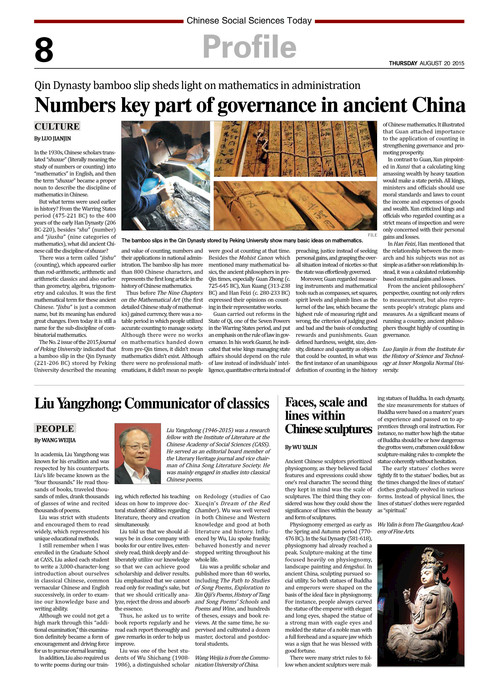Liu Yangzhong: Communicator of classics
2015-08-19 15:37:15
Liu Yangzhong (1946-2015) was a research fellow with the Institute of Literature at the Chinese Academy of Social Sciences (CASS). He served as an editorial board member of the Literary Heritage journal and vice chairman of China Song Literature Society. He was mainly engaged in studies into classical Chinese poems.
By WANG WEIJIA
In academia, Liu Yangzhong was known for his erudition and was respected by his counterparts. Liu’s life became known as the “four thousands.” He read thousands of books, traveled thousands of miles, drank thousands of glasses of wine and recited thousands of poems.
Liu was strict with students and encouraged them to read widely, which represented his unique educational methods.
I still remember when I was enrolled in the Graduate School at CASS, Liu asked each student to write a 3,000-character-long introduction about ourselves in classical Chinese, common vernacular Chinese and English successively, in order to examine our knowledge base and writing ability.
Although we could not get a high mark through this “additional examination,” this examination definitely became a form of encouragement and driving force for us to pursue eternal learning.
In addition, Liu also required us to write poems during our training, which reflected his teaching ideas on how to improve doctoral students’ abilities regarding literature, theory and creation simultaneously.
Liu told us that we should always be in close company with books for our entire lives, extensively read, think deeply and deliberately utilize our knowledge so that we can achieve good scholarship and deliver results. Liu emphasized that we cannot read only for reading’s sake, but that we should critically analyze, reject the dross and absorb the essence.
Thus, he asked us to write book reports regularly and he read each report thoroughly and gave remarks in order to help us improve.
Liu was one of the best students of Wu Shichang (1908-1986), a distinguished scholar on Redology (studies of Cao Xueqin’s Dream of the Red Chamber). Wu was well versed in both Chinese and Western knowledge and good at both literature and history. Influenced by Wu, Liu spoke frankly, behaved honestly and never stopped writing throughout his whole life.
Liu was a prolific scholar and published more than 40 works, including The Path to Studies of Song Poems, Exploration to Xin Qiji’s Poems, History of Tang and Song Poems’ Schools and Poems and Wine, and hundreds of theses, essays and book reviews. At the same time, he supervised and cultivated a dozen master, doctoral and postdoctoral students.
Wang Weijia is from the Communication University of China.



